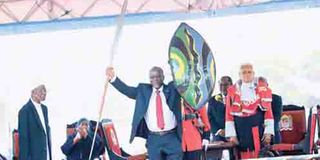EAC: Will Magufuli avoid isolation, show leadership?

President-elect John Magufuli demonstrates the spear and the shield soon after taking the oath of office last Thursday. Expectations are high that he would usher in a new era of Tanzania’s engagement with other East African Community member states.
PHOTO | FILE
What you need to know:
Tanzanian officials have repeatedly denied that the country lags behind in the integration process.
Dar es Salaam. Tanzania has for a long time been portrayed as the reluctant partner in the East African Community.
Tanzanian officials have repeatedly denied that the country lags behind in the integration process. They argue that the collapse of the first EAC and problems in the union with Zanzibar have taught the country a lesson or two on the importance of ensuring that the integration process is steady and well thought after and that any rushed process tends to backfire.
Northern corridor
Frustrated by what they perceive to be Tanzania’s cold feet the three EAC presidents Uhuru Kenyatta of Kenya, Yoweri Museveni of Uganda and Paul Kagame of Rwanda decided to move ahead on their own in July 2013 through what became famously known as the “Coalition of the Willing” (CoW).
They agreed to fast track the political federation and launched the northern corridor transit and transport improvement project that include the construction of the standard gauge railways from Mombasa to Kigali, the oil pipeline from northern and western Ugandan oilfields to the Lamu port.
The intention of the CoW countries was to register progress in those areas that cannot wait for the slower partners.
But one of the unintended consequences of the CoW was to push Tanzania into feeling isolated in the EAC integration process. That kind of feeling certainly exerted psychological pressure on Tanzanian leaders who started complaining publicly about attempts to push the country out of the EAC. Retired President Jakaya Kikwete addressed Parliament in October 2013 and bitterly complained of being unfairly isolated “even in projects that Tanzania was willing and ready to participate.”
“Tanzania will never quit the EAC. We are here to stay and we will play our part to make sure the regional integration moves forward,” he told MPs.
But the original enthusiasm within the CoW soon started to fade and signs of strains emerged. Reports surfaced to the effect that Mr Museveni was unwilling to fund the extension of the standard gauge railways from Kampala to the Rwandan border because the economies of scale on that side were not worthy it. Mr Kagame was then obliged to re-focus his attention to the Dar es Salaam-Isaka-Kigali standard gauge railways through the central corridor, the project that he had, seemingly, dumped in favour of the northern corridor. He unexpectedly buried the hatched and attended a central corridor summit in Dar es Salaam in March this year.
And for all the talk of open sky policy it soon transpired that Kenya was not so willing to open up its sky to airlines from other CoW countries denying Rwandair, for example, the opportunity to enjoy the Kenyan lucrative market. In the October CoW summit in Nairobi Museveni and Kagame had to voice their concerns to Kenyatta on Kenyan refusal to open up its skies more than two years after the agreement was reached.
Uganda also, after some urging from investors, saw it wise to explore the possibility of passing the oil pipeline route through Tanzania to Tanga port due to insecurity in northern Kenya.
On its part Kenya, not to be left out, recommitted itself to strengthen business ties with Tanzania at the occasion of Kikwete’s visit in October. The Kenyan business community initiated the process of establishing the Kenya-Tanzania business chamber to foster and coordinate business and trade relations between the two countries.
Enters Dr John Magufuli
It is in this state of integration quagmire that President John Magufuli takes the helm of the Tanzanian presidency. Expectations are high that he would break from the past and reassure EAC partners that Tanzania means business and can be a reliable partner. Speaking at the weekend in Arusha the EAC secretary General Dr Richard Sezibera said the secretariat had hopes Dr Magufuli will make the integration process one of his top agendas.
“We would advance the EAC agenda to the newly elected president,” he was quoted as saying by the Guardian newspaper.
Partner states will surely watch the manner in which Dr Magufuli maneuvers his way through the EAC. The first signals he sends will be important in defining the direction of the EAC. He should understand that the CoW efforts to advance outside the formal EAC arrangement reflects the inadequacy of the secretariat as far as enforcing agreements and EAC protocols are concerned. The EAC Charter which makes the EAC Summit the ultimate decision making organ. But some of the failures of the CoW point to how key a link Tanzania is in the EAC integration process owing to its strategic geographical position, its population size and relative peace and political stability.
In reassuring EAC partners about the renewed Tanzania’s commitment Dr Magufuli must make some quick gestures. These can include easing movements of people (possibly allowing the use of IDs and voter register cards); relaxing restrictions on the movement of labour across the region and right of residence. But Dr Magufuli must also find ways to convincingly explain to his counterparts the rationale behind Tanzania’s hard positions and should be quick to suggest alternatives.
He must join others in implementing the single customs territory, the open sky police and the one network area.
Most importantly Dr Magufuli should ensure quick progress is made in the central corridor project. The best way is to put the corridor’s infrastructure projects including the Tanga port under the management of the Central Corridor Transit Transport Facilitation Agency like Zambia and Tanzania did for Tazara. The funding of the construction and rehabilitation of these projects could be done jointly with Tanzania, Uganda, Rwanda, Burundi and the DRC.
Political storms
But Dr Magufuli must also show some leadership in the ongoing political storms brewing in the region. The ongoing Burundi crisis is the case in point. Unfortunately the conflict has already taken a regional outlook due to a growing animosity with Rwanda. Uganda, entrusted with brokering peace is not making headways.
And issues such as the chairmanship of the EAC summit, which would have to go to Burundi at the end of this month, and the appointment of the next EAC secretary general, expected to come from Burundi are potential signs of increased frictions.
Burundians would certainly look upon Dr Magufuli to help them retain their rightful place in the EAC amidst accusations of sabotage from some quarters. Dr Magufuli faces the hard task of balancing between ensuring that the EAC strongmen do not have their way into further destabilising and isolating Burundi and engaging all EAC leaders into finding the lasting solution to the Burundian crisis. He must, however, use the stick and carrot strategy when with dealing Pierre Nkurunziza.
Relations with Kenya
Dr Magufuli should carefully manage his friendship with the Kenyan opposition leader Raila Odinga. Obviously the Kenyan government is not comfortable with the ties between the two. Rumours were rife that the Jubilee ruling coalition threw its support to Chadema presidential candidate Edward Lowassa during campaigns. Obviously Dr Magufuli must be the bigger man in the room. He must send a message that the Tanzanian government will work closely with the Kenyan government for the betterment of the two countries and that his friendship with Mr Odinga will have to come second.
Treating Mr Odinga as an equal of Kenyatta as it happened during the swearing in ceremony last week is not the way to go.
“He will also have to reassure President Uhuru Kenyatta that his well-known personal friendship with opposition kingpin Raila Odinga will in no way interfere in the proper diplomatic exchange between Kenya and Tanzania,” veteran Journalist and Lawyer Jenerali Ulimwengu writes in the East African.




